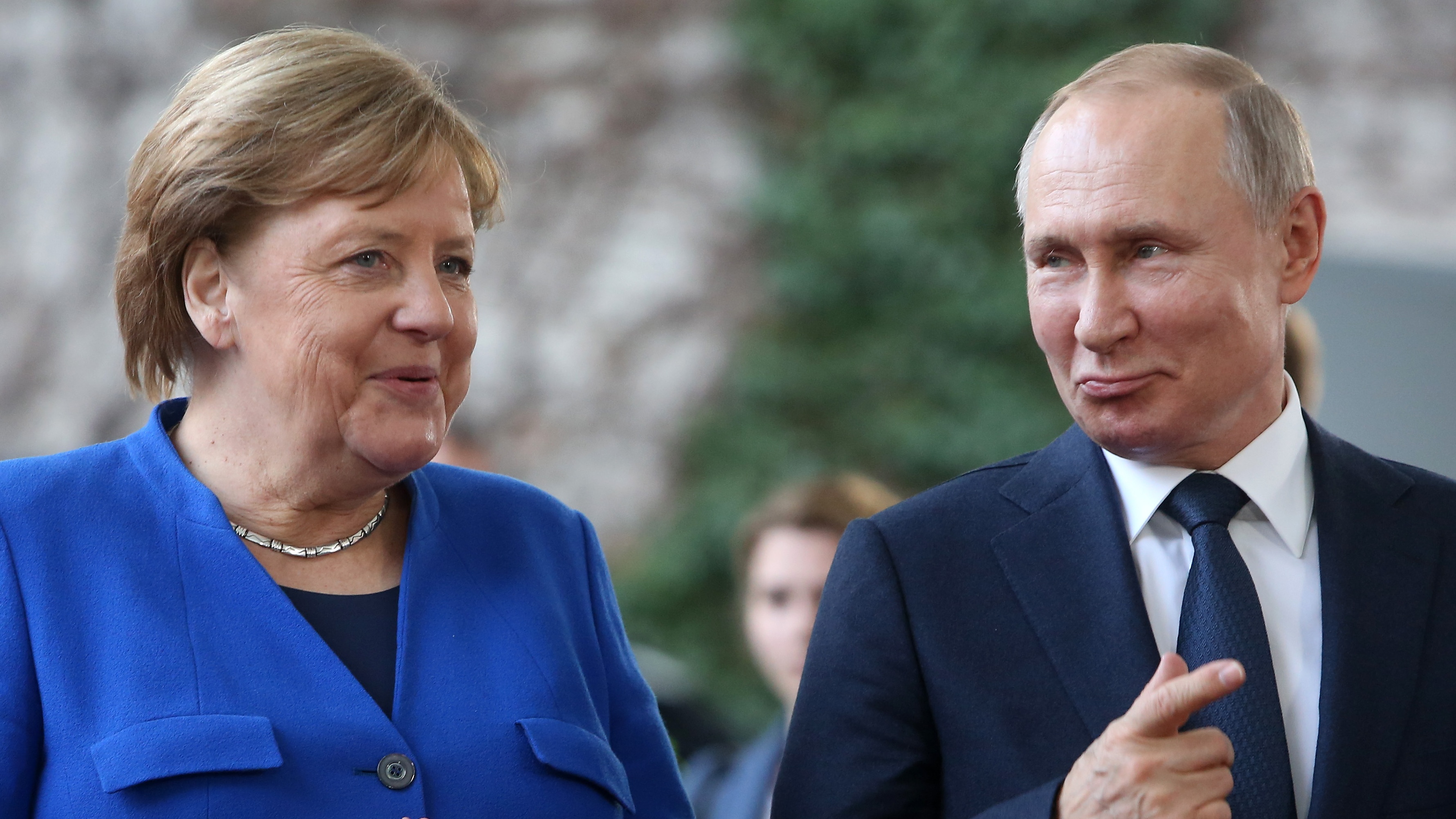‘War debt’: is Germany too close to Russia for its allies’ comfort?
Clash over planned pipeline reignites concern over soft stance towards Moscow

A free daily email with the biggest news stories of the day – and the best features from TheWeek.com
You are now subscribed
Your newsletter sign-up was successful
Germany’s president has provoked anger in Ukraine by arguing that a planned Russian pipeline project should go ahead as Berlin owes Moscow a war debt after the atrocities of the Second World War.
President Frank-Walter Steinmeier told the Rheinische Post that there is a “very different dimension” to the controversial Nord Stream 2 project as a “very chequered history with Russia” has seen “phases of fruitful partnership, but still more times of appalling bloodshed”.
Ukraine’s ambassador in Berlin, Andrij Melnyk, said it was “cynical to bring the atrocities of the Nazi reign of terror into play in precisely this debate”. But it is not the first time Germany has come under scrutiny for its close ties to Russia.
The Week
Escape your echo chamber. Get the facts behind the news, plus analysis from multiple perspectives.

Sign up for The Week's Free Newsletters
From our morning news briefing to a weekly Good News Newsletter, get the best of The Week delivered directly to your inbox.
From our morning news briefing to a weekly Good News Newsletter, get the best of The Week delivered directly to your inbox.
Unlikely friends
Germany briefly flirted with shelving the pipeline project - which will deliver 55 billion cubic metres of natural gas a year from Russia to Germany - following the poisoning of opposition leader Alexei Navalny who recovered from the attack in Berlin.
However, Armin Laschet, the new leader of Germany’s biggest party the Christian Democratic Union (CDU), later said that the project would go ahead as “feel-good moralising and domestic slogans are not foreign policy”. Noting that the US also buys large quantities of crude oil from Russia, he told reporters: “We have to take the world as it is in order to make it better.”
Laschet has come under close scrutiny since winning the CDU leadership election last month after a string of his previous comments on Russia reemerged. The CDU leader, who has a strong chance of succeeding Angela Merkel as chancellor after September’s Bundestag elections, previously attacked “marketable anti-Putin populism” following Russia’s annexation of Crimea in 2014.
A free daily email with the biggest news stories of the day – and the best features from TheWeek.com
He also suggested in a tweet that there was “a lack of evidence to prove that Russia was behind the novichok attack on Sergei Skripal and his daughter Yulia in Salisbury in 2018”, the Financial Times adds.
Opponents of the Nord Stream 2 plans say that it will “increase Europe’s reliance on Moscow for its energy security” while Vladimir Putin is simultaneously “intervening aggressively abroad and crushing dissent at home”, The Times reports. But for now, it looks as if Germany is set on seeing the project through “despite protests from Kiev, Paris, Warsaw and Washington”.
Looking east
Laschet’s historic interventions on Russia place him outside of the mainstream in the CDU. But the end of Merkel’s leadership has seen the emergence of an “enigmatic” approach to Russian relations that have “confounded Berlin’s partners in Europe”, says Noah Barkin, managing editor of the Rhodium Group research company, in an article for Foreign Policy.
This is echoed by Gustav Gressel, a senior policy fellow at the European Council on Foreign Relations, who adds that recent events have “cast new light on the inconsistency of German political elites’ stances on the east”.
“There have long been several major flaws in Germany’s view of its relationship with Russia,” he continues, ranging from “misjudging the Kremlin’s willingness to cooperate on issues”, to a “failure to address the security implications of trade and investment relations with Russia”.
What Germany has historically failed to recognise is that “the EU has nothing to offer and nothing to threaten”, he says. “Why should the Kremlin listen?”
Turning Green
German-Russian relations have “sunk to a new low” following the poisoning and arrest of Navalny, Der Spiegel says. But Merkel’s tough talk after the attack was “almost puzzling”, as “it seemed as if someone had suddenly flipped the switch on Germany’s Russia policy”.
In 2019, Zelimkhan Khangoshvili, a former Chechen rebel commander, was shot in Berlin in a murder blamed on the Russian state. But despite this, Germany continued “playing the role of an interpreter of Russian political language for the West”, the magazine adds.
As Barkin writes on Foreign Policy, there is a “chance that the resurgent Greens could emerge as the strongest political force” in Germany after September’s election, which could see the country’s first Green chancellor and “a more values-based foreign policy that doubles down on European integration and is tougher on Russia”.
With polls suggesting that the Greens could emerge as a coalition partner of the CDU this year, that shift could be around the corner. But with the Nord Stream project steaming ahead, Germany does not appear keen to poke the Russian bear just yet.
Joe Evans is the world news editor at TheWeek.co.uk. He joined the team in 2019 and held roles including deputy news editor and acting news editor before moving into his current position in early 2021. He is a regular panellist on The Week Unwrapped podcast, discussing politics and foreign affairs.
Before joining The Week, he worked as a freelance journalist covering the UK and Ireland for German newspapers and magazines. A series of features on Brexit and the Irish border got him nominated for the Hostwriter Prize in 2019. Prior to settling down in London, he lived and worked in Cambodia, where he ran communications for a non-governmental organisation and worked as a journalist covering Southeast Asia. He has a master’s degree in journalism from City, University of London, and before that studied English Literature at the University of Manchester.